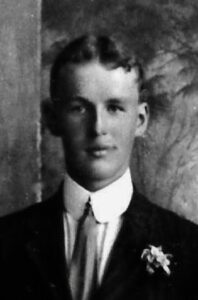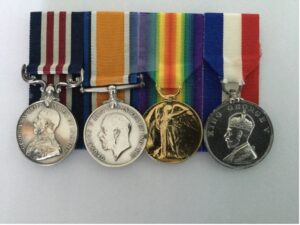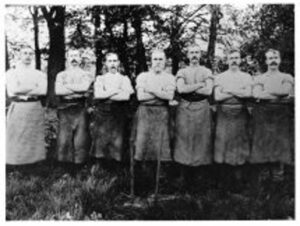The Extraordinary Life of Uncle Billy.

William Wright, aged 19.
Anzac Day approached and I started to reflect on my military ancestors. Last year I presented Uncle Jack’s story of his service at Gallipoli. This year I want to honour another uncle, who served in the First World war. His, was an extraordinary life and the more I learn about him, the more I respect and admire him. Allow me to introduce you to William Wright, MM, alias Harold Harvey and affectionately known to the family as Uncle Billy.
I have dim memories of my first meeting Uncle Billy in High Street, Maitland in the 1950’s when I was a young girl. Back in the 1950’s Uncle Billy was a resident at the Royal Hotel which was demolished in the 1970’s. He and my Dad appeared beside our parked car for several minutes. He was an affable gentleman, a little rotund and quite tall. Had I known then what I now know about Uncle Billy, I know I would have been ‘hanging on his every word’ as I would today if the same opportunity presented itself. Of course, that is never going to happen…he died in 1962. Talk about missed opportunities!
Uncle Billy was known to the locals of Maitland as Harold Harvey. His true identity was completely unknown until one day in 1952 at the Maitland Agricultural Show. My grandparents, Florence and Ted were enjoying the exhibits at the Show when my grandmother spied a familiar face. It was the face of her long lost, presumed dead older brother, William. She observed that he was selling metal coat hangers, a craft that only a blacksmith could produce (Florence’s father and 4 brothers were all blacksmiths). She rushed over to him, calling out to him, “Hello Billy. It’s me Florence.”
Initially Billy claimed that my grandmother was mistaken and insisted that he was Harold Harvey. Nana was determined and eventually Harold Harvey confessed to being William Wright. Florence and Ted met Uncle Billy many times in Maitland, but he always refused to visit their home at the Bank of NSW, in Branxton. Uncle Billy’s personal possessions were given to his sister, Florence after his death and in 1987 following my grandmother’s death, much to my delight, Uncle Billy’s medals were given to me. I have treasured them ever since.

Uncle Billy’s medals. Far left: WW1 Military medal. Far right: Queensland Police medal for merit.
When I took Uncle Billy’s medals to the local RSL club for restoration and identification, the members were particularly interested in one medal apparently the Queensland Police medal of Merit. They had never seen one before. They also informed me that one of the medals was the Military Medal from WW1. I was thrilled to know that Uncle Billy had these two prestigious medals and I felt eager to know why. A visit to the Queensland State Archives revealed that William Wright joined the Queensland Police force in 1913 and was working as Constable Wright at Roma in 1915. The Western Star and Roma Advertiser reported an account of the worst fire ever recorded in Roma. It started in the Royal hotel and due to the brave action of Constable Wright, there were no casualties. Uncle Billy entered the blazing hotel to rescue all occupants and deliver them to safety. The entire community praised uncle Billy’s courage and the Police Commissioner awarded him the Police medal for merit.
As for the Military medal for ‘bravery in the field’, Uncle Billy enlisted in 1916 and joined the 42nd Battalion, serving in France. He was a stretcher bearer, an unarmed soldier who was more vulnerable to being wounded or killed by artillery. During the Battle of Messines, Uncle Billy worked tirelessly treating the wounded at the frontline and organising other stretcher bearers to carry them to safety. General Monash recognised his valour and presented him with the Military medal. It seemed that our Uncle Billy was a hero! Firstly, for rescuing patrons of the hotel in Roma and then during the First World war for rescuing wounded soldiers during the battle of Messines. He had saved the lives of others at great peril to himself.
At some time in his life, Uncle Billy chose to forsake his family and his life in Queensland. He disappeared from Brisbane, leaving no forwarding address. Some family members believed that he had died. There was uncertainty about when he disappeared. Some believed it occurred following the end of the war in 1918 whilst others felt he left during the 1920’s. Sadly no-one seems to know why he chose to disappear. In the 1950’s he was identified as being William Wright by his sister, Florence and at that time he was known as Harold Harvey. Changing his identity is a drastic action given that he was a celebrated hero.

Wright family of Blacksmiths.
There were two life changing events that may well have been the impetus for his drastic change in direction. The first one occurred during his war service. In February 1918, Corporal John Wright, had been admitted to the Military hospital at Fovant in England. He was critically ill with pneumonia and Uncle Billy was granted furlough so that he could sit beside his dying brother. After John passed away Uncle Billy was the sole family member to witness his full military funeral and burial in the Military churchyard at Fovant. Having experienced the brutality of war and witnessed the slaughter of young men, Uncle Billy was possibly finding it difficult to cope.
The other distressing event occurred back home at Coorparoo. One day in 1927, when it was realized that his young sister, Elizabeth was missing, Uncle Billy was asked to go and look for her. When I think of how Uncle Billy found his dead sister in the Coorparoo creek, and how he carried her body back home, it distresses me very much. There were rumours of suicide because Lizzie was pregnant and unmarried. Perhaps this tragic event was totally catastrophic for Uncle Billy. I do know that he is listed among the living children of his father’s death certificate (1937) but he is listed as deceased on his mother’s death certificate (1942). It is unlikely that I will ever know the truth of his disappearance. I suspect that the only family members who can help to explain have been deceased for many years. It seems that his story is yet another, destined to lie beneath the proverbial carpet.

Beautifully written Bev. Sad ending though. I have heard of others who just disappeared after returning from war service. I had an uncle who was a POW in Changi Prison. He never settled back into civilian life and moved from place to place around S-E Qld, living in boarding houses and caravan parks. If he visited the family, it was very brief, because he always had to get the bus back to wherever he lived at the time.
Thankyou Catherine for your interesting comment. Changi was hell for the POWs and I have absolute respect and compassion for those men. I have read enough about the horrors of war to become a passionate pacifist! LEST WE FORGET.
Thank you Beverley.Your writing is incredible.So many of us have sad stories of our loved ones who were physically and mentally destroyed through war but not everyone can write the stories for us all to feel the aftermath. By writing this story you have made me feel the heartache.So very real!
My sincere thanks to you Gayle. What a lovely comment.
My uncle was a Rat of Torbruk and suffered mental torment afterwards. He went missing for months after he returned home. Some Boy Scouts found his body on Mount Coot-Tha. I’m sure the effects of war are passed down through the generations. Thanks for sharing Uncle Billy’s story.
Such a tragic story Di. How sad. I can’t help wondering how many other families have similar stories to tell. Yet another reminder of the wickedness and tragic waste of lives that accompanies war. Thankyou for sharing.
What an interesting story about an amazing man. Very sad to think he had no help to work through his trauma, especially after his heroism saved others. Well done Bev for bringing his story to life in such a lovely tribute.
How old was William when he died?
Uncle Billy was 70 when he died Chris so I guess he was one of the lucky ones to have been given his 3 score years and ten. The Wright family were a respectable, Methodist family and I suspect that the cause of Uncle Billy’s alienation was due to his problematic behaviour post all the trauma and perhaps the lack of family support. As I said, one will never know. I certainly feel a huge amount of respect and compassion for Uncle Billy and for anyone who has served during wartime.
Enjoyed reading this blog, Beverley. This Uncle Billy certainly had an extraordinary life. I’m sure you may have explored Trove for the names William Wright or Harold Harvey for any more hints of what Uncle Billy might have done after World War I. Trove has helped me fill in a few gaps for some of my relatives and ancestors.
I’m so pleased that you appreciated my story of my Uncle Billy, Ross. His story touched me and I regard him as my hero. Thanks for the reminder about Trove. It’s been a long time since I explored Trove and I found reports of the Roma fire at that time. I failed to find any reports into the death of Uncle Billy’s sister but family rumours explain that Uncle Billy’s brother, who was an MP intervened and prevented the incident from being published. Not sure that would happen today.